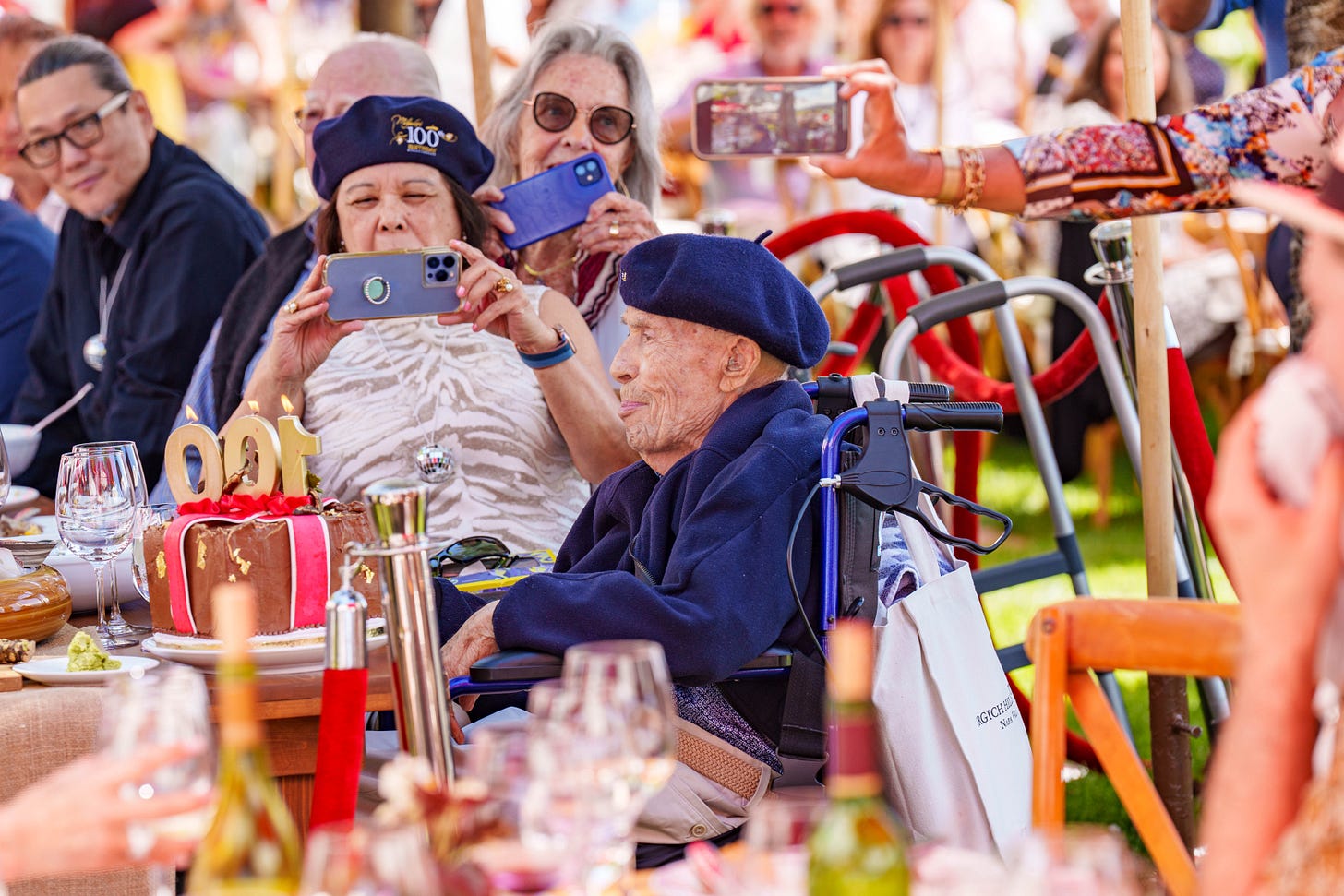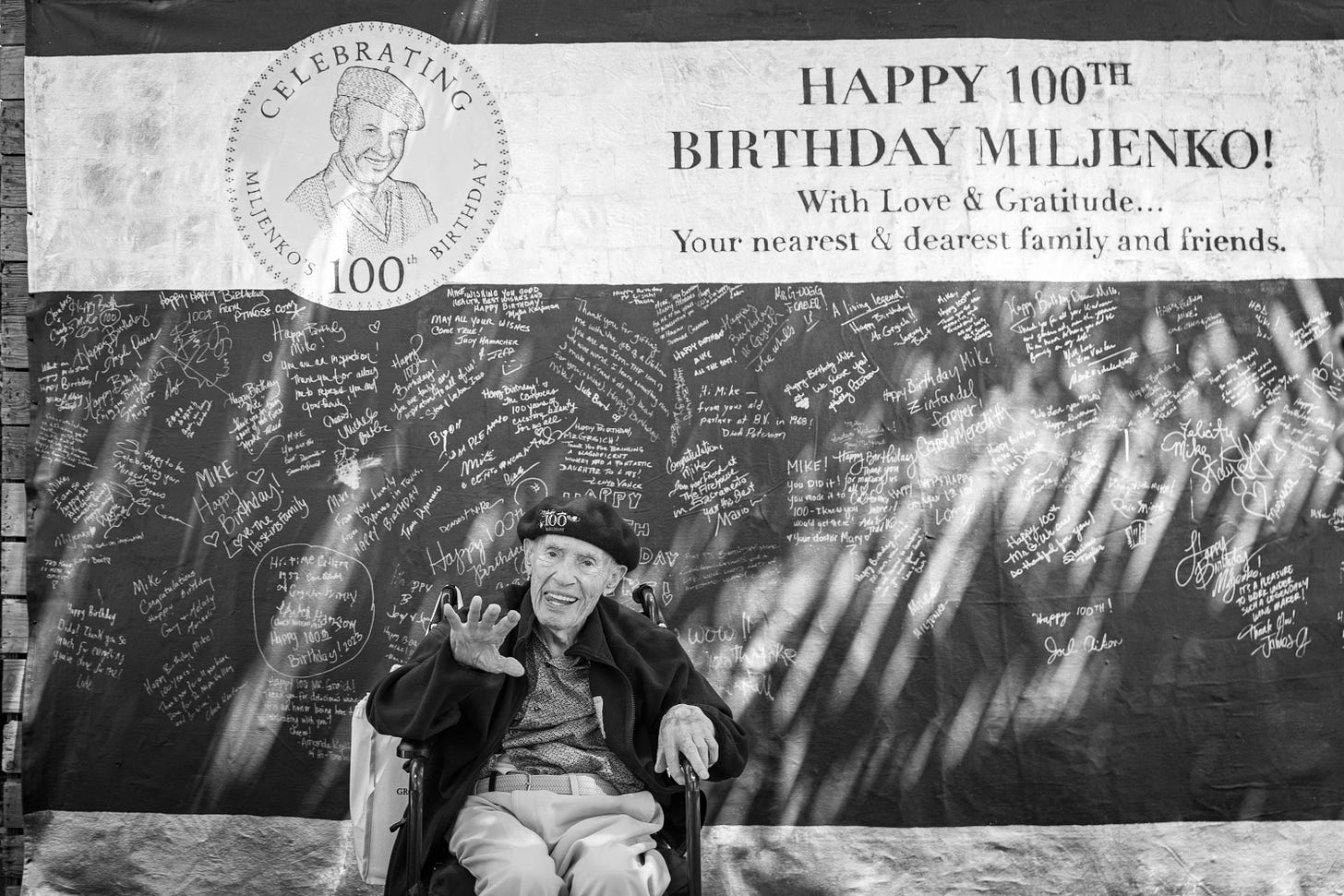Top stories of 2023 #10: Celebrating a Century: Winemaker Mike Grgich Turns 100
By Sasha Paulsen
As 2023 draws to a close, we're dedicating the final two weeks to a retrospective countdown of the year's most-read stories. Spanning a broad spectrum of subjects, these pieces mirror the varied curiosities of our audience and pave the way for an exciting 2024. Join us as we revisit these highlights.
Original run date: May 24, 2023
Editor’s note: On Dec. 13, 2023, Miljenko “Mike” Grgich passed. You can read his obituary here.
NAPA VALLEY, Calif. — Throughout his life Miljenko “Mike” Grgich has remembered — and practiced — three pieces of advice his father gave to him when he was a boy in Croatia:
Every day do your best.
Learn something new every day.
And every day make a new friend.
By the time you reach 100 years, that’s a lot of friends.
Many of them gathered over the May 20 weekend to celebrate with the Napa Valley vintner, who is frail now and in a wheelchair but still wears his trademark beret and is still spunky enough to sing his favorite song, “You Are My Sunshine.”
Grgich actually hit 100 on April 1.
“But he’s no fool,” quipped his daughter, Violet, who added, “I can’t tell you how wonderful this is to celebrate his 100 amazing years.”
Waiting until her father returned from his winter home in La Quinta, Violet, now president of Grgich Hills Family Estate Winery, and Mike Grgich’s nephew Ivo Jeramaz, vice-president and winemaker, hosted the two-day celebration of the remarkable life and accomplishments of a man who steadfastly believes in miracles.
It’s an apt conclusion, perhaps, from a man born the youngest of 11 children in a Croatian village, who as a university student in Zagreb who was able to escape from what was then part of communist-ruled Yugoslavia with a suitcase filled with winemaking textbooks and American dollars hidden in his shoe. He then endured a four-year-long journey to get himself to a place he had heard was “Paradise” — California.

He went on to make the chardonnay wine that, in 1976, came out on top in a blind tasting by French wine experts of wines from California and the storied regions of France — Burgundy and Bordeaux — the tasting now known as the Judgment of Paris. Warren Winiarski, whose 1973 cabernet sauvignon from his newly founded Stag’s Leap Wine Cellars was the top-scoring red wine, has called the historic tasting the event “that taught the world that beautiful wines could be made in somewhere besides France.”
Grgich subsequently went on to realize a life-long dream in 1977 and co-found his own winery in Napa Valley with Austin Hills.
Hills was among the guests at the celebration, which began with a tasting on May 19 at the Culinary Institute of America at Greystone and continued on May 20 with a grand party at the winery that included Croatian folk dancing, birthday cake and a feast prepared by chefs Masaharu Morimoto, Gary Penit and Ivo Obad.
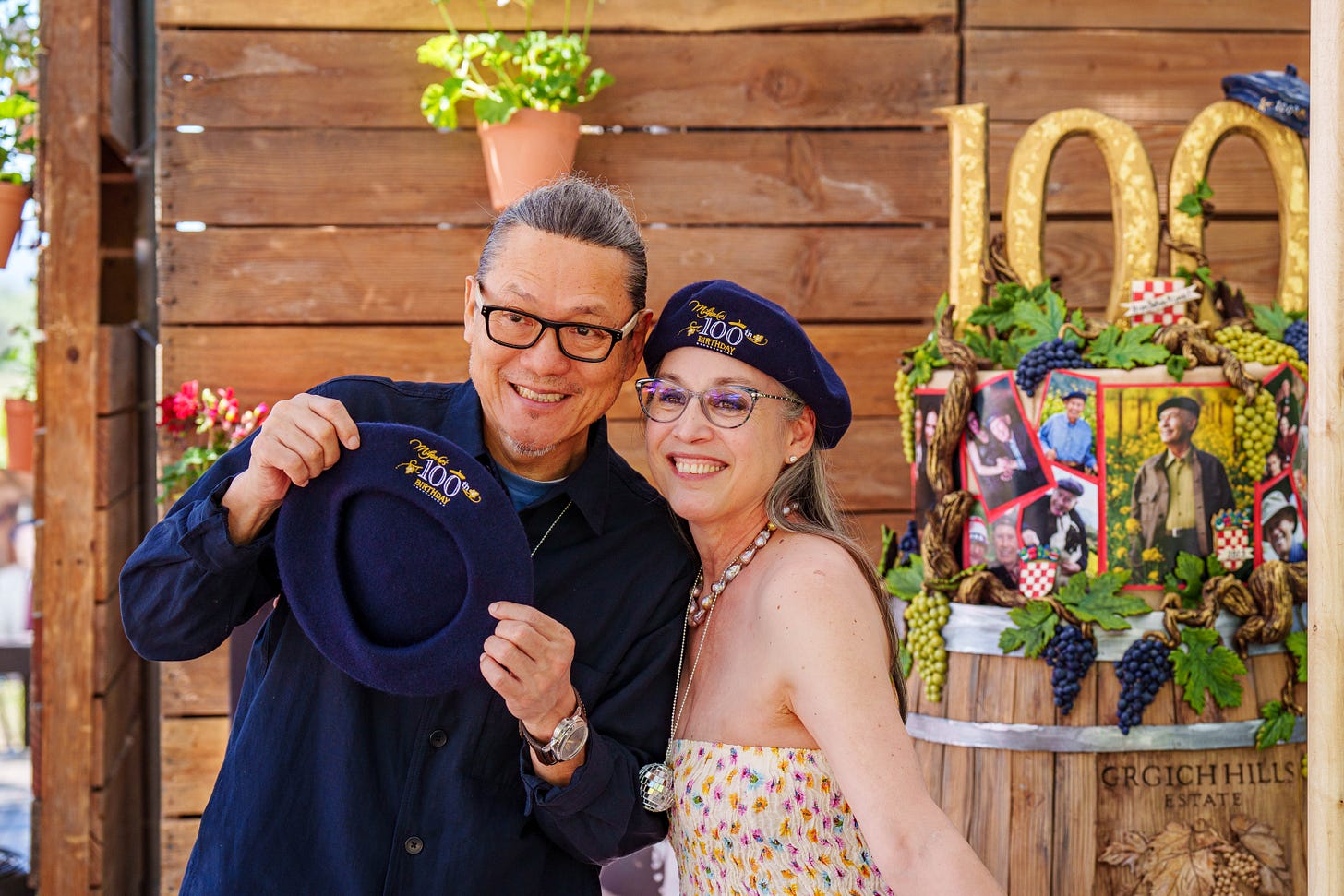
Hills recalled talking to Grgich about the idea of founding a winery.
“Mike told me that Cyril Magnin had also talked to him. I told him, ‘Mike, Cyril will only talk about starting a winery. We will do it.”
The tasting included Grgich Hills Estate library wines, as well as ones Grgich made at other wineries after he arrived in Napa Valley. He first worked for Lee Stewart, a pioneer in the wine renaissance after Prohibition had shut down most winemaking in Napa Valley. From there he went to Beaulieu Vineyard, where he worked with another refugee from communism, André Tchelistcheff. His next stop was the newly opened Robert Mondavi Winery on Highway 29
There Grgich made the 1969 cabernet sauvignon and the 1969 chardonnay that won acclaim for Mondavi wines. Finally Grgich worked at Chateau Montelena, where he created the 1973 chardonnay that won the Judgment of Paris.
The tasting included the 1966 and 1967 Beaulieu Vineyard Georges De Latour as well as 1969 Robert Mondavi Cabernet Sauvignon and Chardonnay, the Chateau Montelena 1972 Chardonnay and 1973 Cabernet Sauvignon as well as 1980 Grgich Hills Estate Napa Valley Cabernet Sauvignon.
The tasting also included the first vintage of a new Grgich Hills wine, the 2019 Crljenka Kastelanski Miljenko Selection, made from a rare Croatian grapevine, which Jeramaz has carefully cultivated on 2 acres of vineyards near Grgich’s Calistoga home.
“The yields are incredible,” Jeramaz said.
Grgich attended both the tasting and the party, where accolades poured in. Among the guests were Robert Mondavi’s sons, Michael and Tim, along with Bo Barrett, owner of Chateau Montelena.
“They’re still alive,” Tim Mondavi said of the historic wines, which he called, “fabulous wines to take you back to the days of yore.”
“It’s an honor and a pleasure,” Michael Mondavi told Grgich. To the guests, he added, “I had the honor of meeting Mike in 1968. We needed his expertise. He actually drove us a little crazy with his focus on sanitation, his attention to detail. But Mike brought us into the future.”
Michael Mondavi also talked about the work of the Napa Valley Wine Technical Group, in which both Robert Mondavi and Grgich, along with other early winemakers, took part.
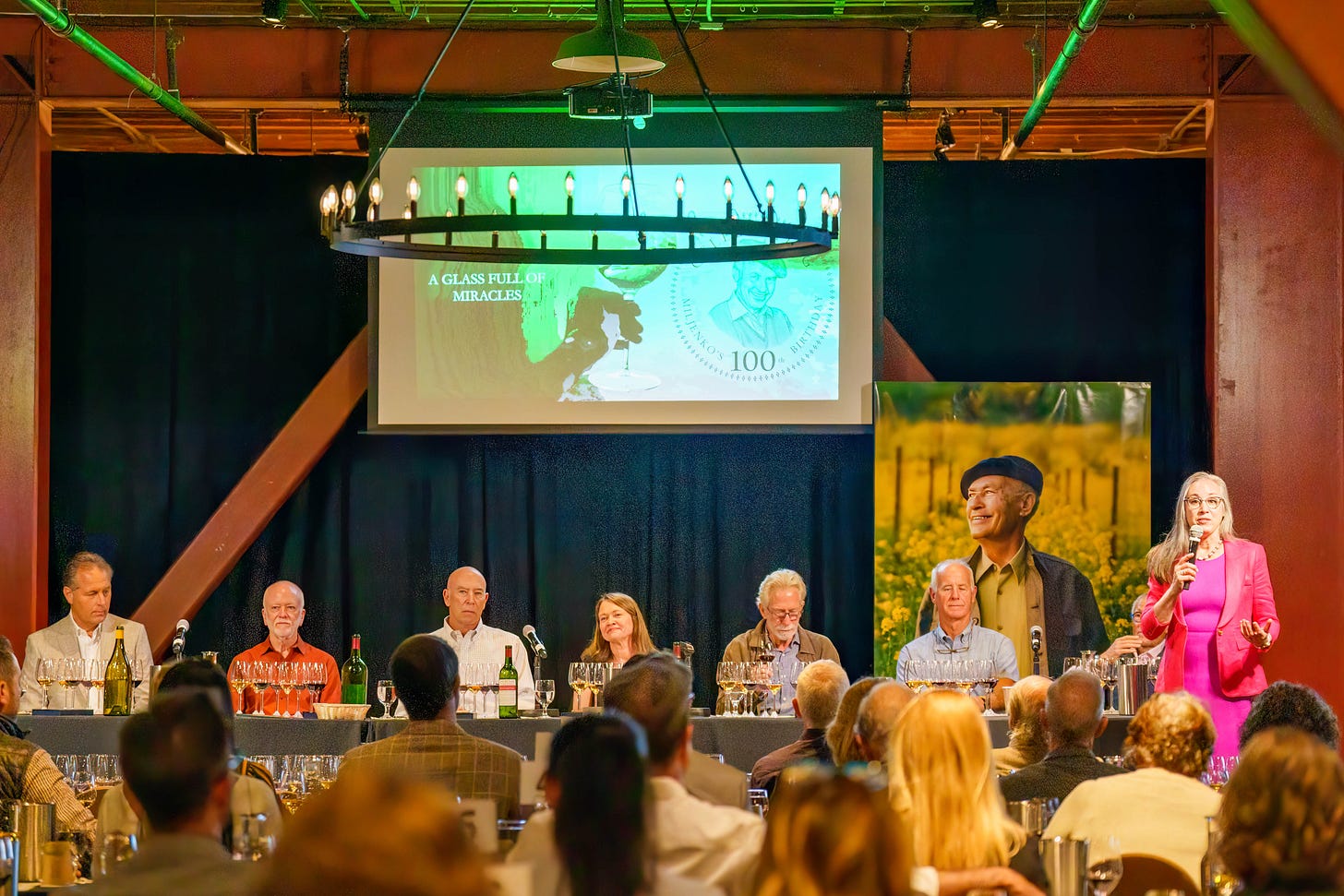
“My father said, ‘We need to share,’” he said.
In his 2013 autobiography, “A Glass Full of Miracles,” Grgich wrote that the reason Napa Valley vintners were able to progress so rapidly in the quality of their wines was this spirit of sharing.
Tim Mondavi recalled watching Grgich in the lab wearing his white coat and being impressed with “all this wizardly in the lab. It was a mystery. There was a lot of mystery in what was going on.”
“Those were the days when we were still building back from Prohibition,” he said. “The most abiding thing I learned from Mike is that when you make wine you work from your heart. Wine, he told us, is like a baby.”
Barrett said he wasn’t sure Mike was impressed with him, “the surfer-dude from LA” who came up north to the Calistoga ghost winery his father, Jim Barrett, purchased in 1972. But, he said, “I remember him telling us that winemaking is 90% sanitation and 10% art. Then he laughed and said, ‘probably more sanitation.’”
Barrett added, “But he taught us the job of wine is to make people happy, to make people’s lives better, one glass of wine at a time.”
Jeramaz described how, as a youth in Croatia, his dream was to come to America.
“My Uncle Mike was my best hope,” he said. “He was not too enthusiastic about this, but my grandmother and my mother asked him, and so he sent me a ticket. My first plane ride in my life was Zagreb to San Francisco, and when I got there, he was waiting for me. He changed my life.”
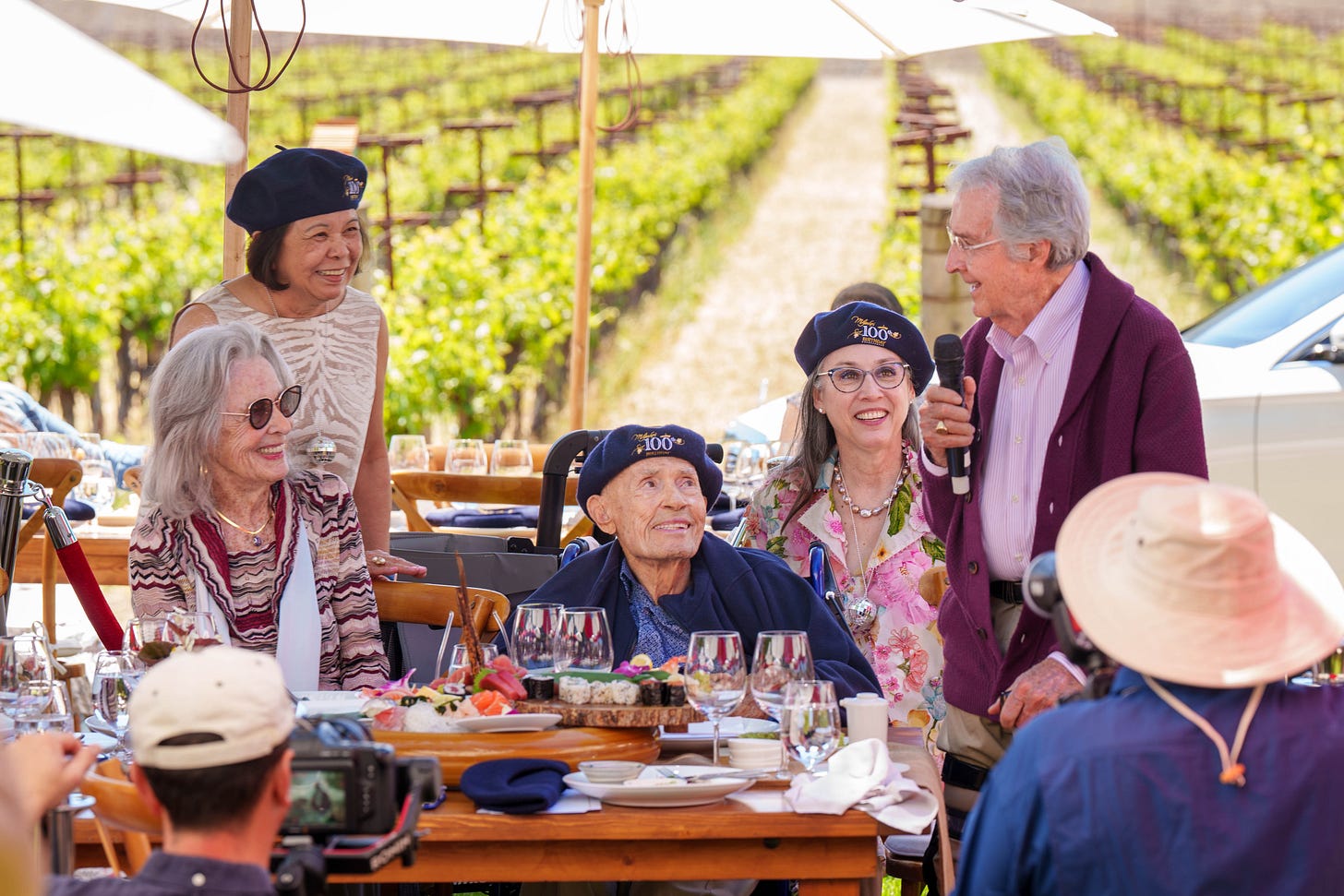
Also joining Mike for the Saturday lunch was Winiarski, now 94.
“We’re partners in crime,” Winiarski said of Grgich, “because we took it away from the French. They don’t make any less-beautiful wines. We just make more-beautiful wines.”
They may have made the wines that won the Judgment of Paris, but, Winiarski said, “We both had three teachers: Lee Stewart, Robert Mondavi and André Tchelistcheff. From Lee Stewart we learned that no detail in making wine is too small not to give it our fullest attention. Robert taught us that no goal is so high it cannot be reached. And from André we learned that the final goal for any wine is its beauty.”
Meanwhile, the diminutive winemaker from Croatia, “the embodiment of the American dream in front of us,” as one guest said, smiled and waved to the crowd. “Thank you,” he said.
Sasha Paulsen is a Napa Valley-based novelist and journalist.





